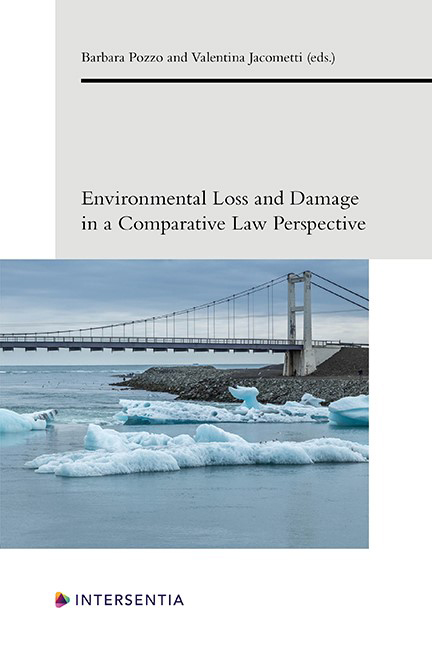Book contents
- Frontmatter
- Preface
- Contents
- List of Authors
- PART I LIABILITY FOR ENVIRONMENTAL HARM IN THE EU
- PART II PRIVATE AND CORPORATE ENVIRONMENTAL LIABILITY
- PART III THE ROLE OF CRIMINAL LIABILITY
- PART IV LEGAL TRANSPLANTS IN THE ENVIRONMENTAL FIELD: THE CASE OF ENVIRONMENTAL LIABILITY
- PART V STATE AND INTERNATIONAL ENVIRONMENTAL LIABILITY
- PART VI CLIMATE CHANGE LIABILITY
- PART VII LIABILITY, CLIMATE CHANGE AND NATURAL HAZARDS: THE ROLE OF INSURANCE
- PART VIII REAL COMPENSATION AND OFFSET REGIMES: THE STRATEGY OF “NO NET LOSS”
- About the Editors
No Net Loss and Forest Off sets in the Flemish Region: A Cautionary Tale of How Not to Reconcile Science-Based Conservation Policies with Economic Interests and Vested Rights?
Published online by Cambridge University Press: 26 May 2021
- Frontmatter
- Preface
- Contents
- List of Authors
- PART I LIABILITY FOR ENVIRONMENTAL HARM IN THE EU
- PART II PRIVATE AND CORPORATE ENVIRONMENTAL LIABILITY
- PART III THE ROLE OF CRIMINAL LIABILITY
- PART IV LEGAL TRANSPLANTS IN THE ENVIRONMENTAL FIELD: THE CASE OF ENVIRONMENTAL LIABILITY
- PART V STATE AND INTERNATIONAL ENVIRONMENTAL LIABILITY
- PART VI CLIMATE CHANGE LIABILITY
- PART VII LIABILITY, CLIMATE CHANGE AND NATURAL HAZARDS: THE ROLE OF INSURANCE
- PART VIII REAL COMPENSATION AND OFFSET REGIMES: THE STRATEGY OF “NO NET LOSS”
- About the Editors
Summary
INTRODUCTION
Notwithstanding the widespread conservation efforts throughout recent decades, the world is currently witnessing an unprecedented decline of the remaining biodiversity, which some authors now equate to a “sixth extinction wave”. In spite of its progressive environmental legislation, such as the EU Habitats Directive (92/43/EEC) and Birds Directive (2009/147/EC) (the “Nature Directives”), the EU is no exception to the general rule of continuing biodiversity decline, with a major share of the EU's protected species and habitats currently under an unfavourable conservation status. Even common or “ordinary” biodiversity is not faring better in many Member States, whilst landscape fragmentation is continuing to unabatedly affect a large share of the EU's territory. In 2010, the EU established the overarching objective of halting the loss of biodiversity and the degradation of ecosystem services by 2020, and of restoring 15 per cent of the degraded ecosystems wherever feasible. In order to limit further loss and to achieve its progressive restoration pledges, there is a broad consensus that further biodiversity loss needs to be avoided or, at the very minimum, compensated. The same year, the European Commission made a commitment to propose an initiative to ensure that there is no net loss (NNL) of ecosystems and their services (e.g. through compensation or offsetting schemes). To that end, the Environment Council of Ministers explicitly stated in its conclusions of 21 June 2011 that “a common approach is needed for the implementation in the EU of the ‘no net loss’ principle”, inviting the Commission to draw on the experience and specificities of each Member State. It was further clarified that within this context, the NNL principle entails “that conservation/biodiversity losses in one geographically or otherwise defined area are balanced by a gain elsewhere, provided that this principle does not entail any impairment of existing biodiversity as protected by EU nature legislation.”
Although the European Commission has presented several studies on the further operationalisation of NNL in recent years, no explicit set of binding EU rules currently exists to comprehensively address NNL outside the specific context of biodiversity, which is already explicitly protected under the EU Nature Directives, or, to a certain extent, the water bodies covered by the Water Framework Directive (2000/60/EC). Nor has any other policy instrument been adopted to lay down a more comprehensive approach to NNL.
- Type
- Chapter
- Information
- Environmental Loss and Damage in a Comparative Law Perspective , pp. 499 - 534Publisher: IntersentiaPrint publication year: 2021
- 1
- Cited by



